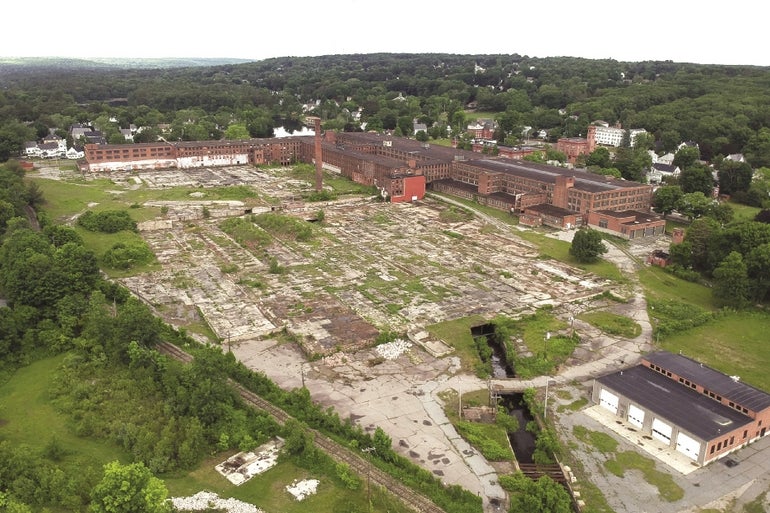After 40 years of vacancy, the 1-million-square-foot Draper Mill facility is being demolished, leaving Hopedale with the chance to completely reinvent itself.
Get Instant Access to This Article
Subscribe to Worcester Business Journal and get immediate access to all of our subscriber-only content and much more.
- Critical Central Massachusetts business news updated daily.
- Immediate access to all subscriber-only content on our website.
- Bi-weekly print or digital editions of our award-winning publication.
- Special bonus issues like the WBJ Book of Lists.
- Exclusive ticket prize draws for our in-person events.
Click here to purchase a paywall bypass link for this article.
Hopedale’s history is almost bigger than the town itself. For more than 175 years, the five-square-mile town located southeast of Worcester has been shaped around the Draper Mill, which employed hundreds of residents before closing in 1980.
After 40 years of vacancy, the 1-million-square-foot facility is being demolished, leaving Hopedale with the chance to completely reinvent itself – an opportunity as exciting as it is daunting, said Town Administrator Diana Schindler.
“Like no other town that I’m familiar with in my whole career, we have the opportunity to reform our village center,” Schindler said. “That doesn't come along often, if ever.”
Having previously served as town administrator in Southampton, Orange, and Deerfield, Schindler took on her position in Hopedale in April 2020.
At that time, the town was at the tail end of a two-year attempt to seize the Draper property by eminent domain and turn it into a mixed-use housing and commercial space. The effort sparked a lawsuit from Draper site owner Philip Shwachman, CEO and founder of First American Realty, Inc. of Worcester.
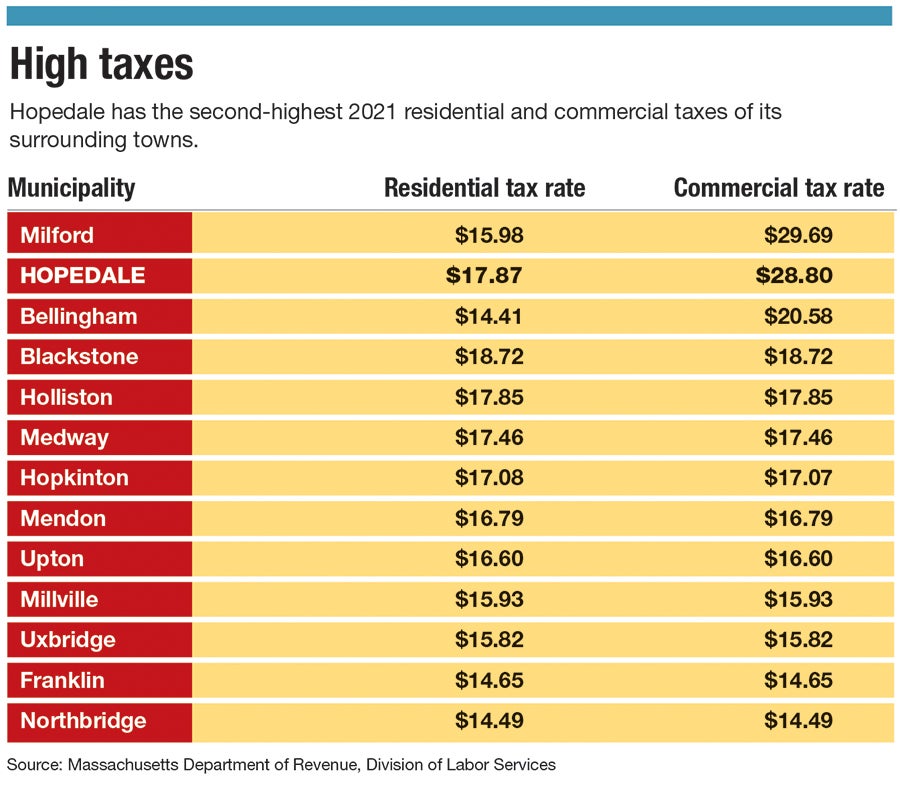
Planning for the future
After a partial collapse in July, the Draper Mill’s demolition began in fall of 2020, opening up the next chapter of Hopedale’s story.
To create a foundation for this new phase, Schindler helped jumpstart the town’s first master plan, a compilation of resident input to nail down development goals for the next 10 to 20 years.
The master plan steering committee is working with Schwachman, who is creating his own master plan for the Draper site in collaboration with the Worcester Business Development Corp.
“The town really cannot control how [the Draper site] can be redeveloped. The town does not own that property. What we can do now is say what we would like to see and what we would not like to see,” said Jim Abbruzzese, chair of the master plan steering committee.
As it nears the end of phase one, the plan is shaping up to have three main focuses, including economic development, land use, and historic and cultural resources, Abbruzzese said.
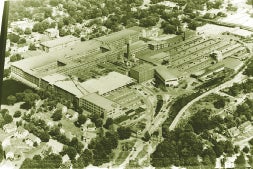
With its unique history, Hopedale is facing a distinct set of challenges.
There are more than 1,100 people per square mile, which classifies it as an urbanized area, according to the U.S. Census Bureau. Yet, the business sector is almost nonexistent.
“What people are looking for are business opportunities to bring small businesses to help offset some of the real estate taxes that we all pay to help grow that revenue base in town,” said Abbruzzese.
Hopedale has the second highest taxes for both residential and commercial properties of the 12 towns surrounding it.
Encouraging marijuana growth
Russell Bogartz, a resident and one of the town’s few business owners, said there may be a silver lining to Hopedale’s tax revenue challenges.
“Hopedale has not placed a limit on the number of cannabis establishments of any sort. You might ask why they haven’t done that. One reason is that they are starving for tax revenue,” he said.
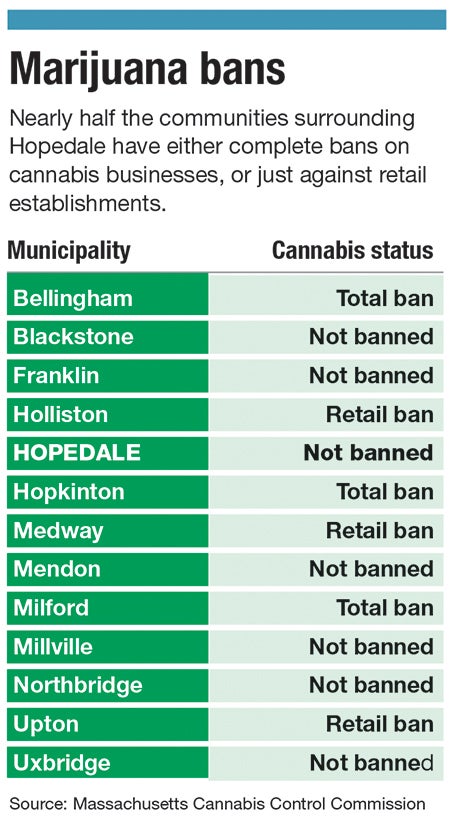
Bogartz opened his adult-use cannabis shop, High Hopes LLC, nearly two months ago and is averaging roughly 80 customers a day, he said.
Meanwhile, Caroline’s Cannabis of Uxbridge on Sept. 17 received final licensure to open a second location, in Hopedale; and the owners of Blackstone Valley Naturals, another Uxbridge cannabis microbusiness, purchased the site of Hopedale’s former Green Mountain Chocolate Co. in September.
“There are many towns around [Hopedale] that [have] banned [marijuana businesses], which makes it an insulation against market saturation,” said Bogartz.
Six of the 13 towns surrounding Hopedale have either a retail ban or a complete ban on adult-use cannabis establishments, according to the Massachusetts Cannabis Control Commission.
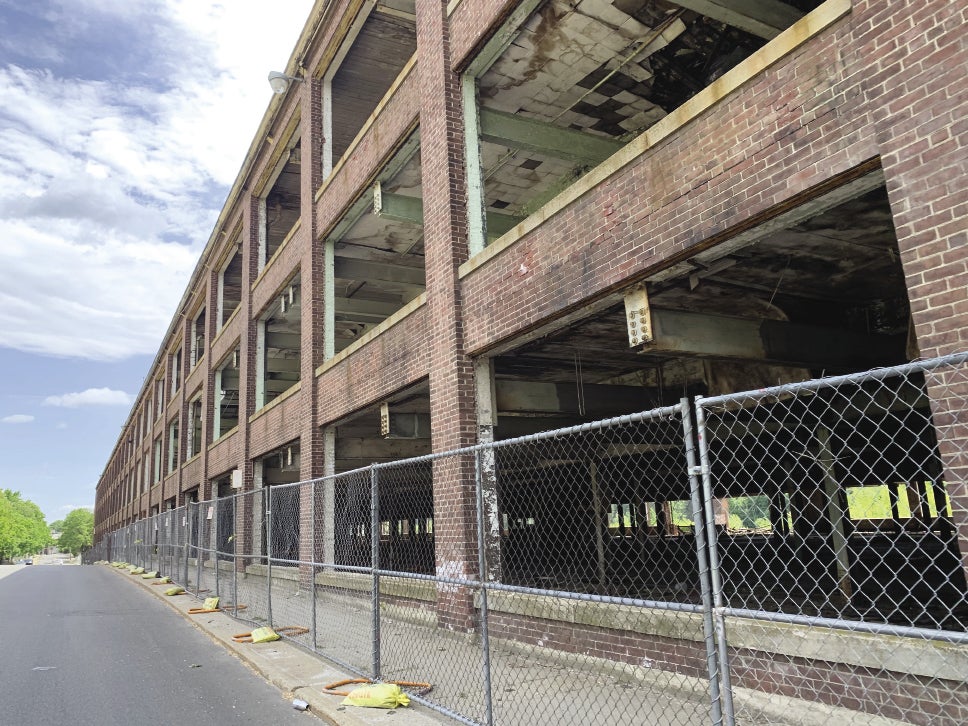
Small-town character
Despite the potential for total reconstruction, residents and decision makers want to ensure Hopedale doesn’t become unrecognizable, said Abbruzzese.
“People are looking … to maintain the town’s character and grow in a way that makes sense for the town. We don’t necessarily want to grow so big that we can’t manage ourselves,” he said.
Outside of the cannabis industry, Schindler said she is looking to be especially innovative in re-envisioning the downtown center.
She said commercial development is limited because most of the roads leading into Hopedale are small, making it more difficult to bring in trucks and deliveries. The impact of online shopping and the coronavirus pandemic has made the town’s leadership hesitant to invest in brick-and-mortar retail, she said.
Schindler mentioned agro-tourism and a center for artisans as two possibilities to bring in tax revenues while maintaining the small-town character of Hopedale.
“Hopedale is at a crossroads,” said Bogartz. “They have to decide what kind of town they’re going to be.”
